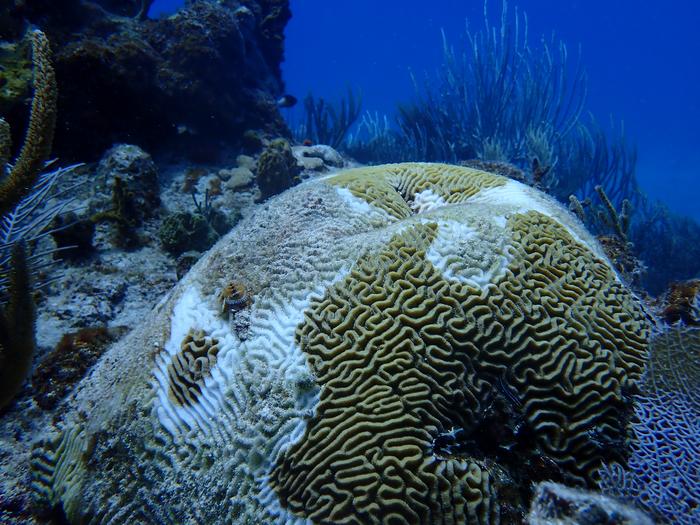Woods Hole, Mass– The human gut is full of microbes. Some microbes can make people sick, while others are responsible for balancing gut health. But humans aren’t the only species who’s health depends on these microorganisms. Coral reef ecosystems rely on microorganisms to recycle organic matter and nutrients. These cells also help feed corals and other life reliant on reefs. Researchers from WHOI studied the microbes in coral reef water by examining eight reefs in the U.S. Virgin Islands over a period of seven years, which included periods of hurricane and coral disease disturbance.

Credit: (Cynthia Becker, ©Woods Hole Oceanographic Institution)
Woods Hole, Mass– The human gut is full of microbes. Some microbes can make people sick, while others are responsible for balancing gut health. But humans aren’t the only species who’s health depends on these microorganisms. Coral reef ecosystems rely on microorganisms to recycle organic matter and nutrients. These cells also help feed corals and other life reliant on reefs. Researchers from WHOI studied the microbes in coral reef water by examining eight reefs in the U.S. Virgin Islands over a period of seven years, which included periods of hurricane and coral disease disturbance.
“Coral reefs have been declining for decades. Climate change, hurricanes, disease, and other stressors have played a major part in that.” said Cynthia Becker, first author of the study and recent graduate of the MIT-WHOI Joint Program. “Reefs provide habitat for about 25% of all marine species, but they also support billions in tourism and fishing. It is important for us to monitor changes in coral reefs as they are happening and the microbes in their environment can really help us do that.”
The study “Microorganisms uniquely capture and predict stony coral tissue loss disease and hurricane disturbance impacts on US Virgin Islands reefs,” published in Environmental Microbiology explains the impacts coral reef disturbances have on microbes. During the two major events studied, hurricanes Irma and Maria in 2017 and the stony coral tissue loss disease outbreak starting in 2020, there were increases of ammonium concentration in the water, leading to a 34% decline in Prochlorococcus bacteria. Prochlorococcus is a small photosynthetic bacteria, which brings new carbon into the coral’s ecosystem, supporting its health, but also producing oxygen for our atmosphere.
“A lot of how we study coral reefs is done on a macroorganismal level. However, alterations in corals and fish communities might remain unseen for months or years. This makes it difficult to track the health of these vulnerable reefs in real time,” said Amy Apprill, a microbial ecologist at WHOI and corresponding author of the study.
“Microbes are the hidden engines of coral reefs, and they grow quickly and are responsive to nutrient, temperature, pH and other conditions. By sampling the water, we can see the immediate impacts of disturbances and intervene to support the reefs before the situation potentially worsens.”
Researchers used eDNA to analyze the reef’s microbial community. This genomic technique involved collecting reef water samples, where there are about 1 million microbial cells in every milliliter, and sequencing the microbial DNA in the samples to identify microorganisms. This provides scientists with a noninvasive way of gathering near real-time information about the reef’s condition.
“Understanding the composition of a healthy reef microbial community is important. Without the balance of micro and macroorganismal health, you cannot have a healthy functioning ecosystem,” Becker said. “Another benefit to this advancement is for coral reef restoration efforts. The microorganisms can provide an assessment of the ecosystem health. This could complement visual assessments to determine if a reef’s health has been restored.”
This research was supported by The Tiffany Foundation, NOAA, WHOI Ocean Ventures Fund, the National Science Foundation and WHOI’s Reef Solutions Initiative.
About Woods Hole Oceanographic Institution
Woods Hole Oceanographic Institution (WHOI) is a private, non-profit organization on Cape Cod, Massachusetts, dedicated to marine research, engineering, and higher education. Established in 1930, its mission is to understand the ocean and its interactions with the Earth as a whole, and to communicate an understanding of the ocean’s role in the changing global environment. WHOI’s pioneering discoveries stem from an ideal combination of science and engineering—one that has made it one of the most trusted and technically advanced leaders in fundamental and applied ocean research and exploration anywhere. WHOI is known for its multidisciplinary approach, superior ship operations, and unparalleled deep-sea robotics capabilities. We play a leading role in ocean observation and operate the most extensive suite of ocean data-gathering platforms in the world. Top scientists, engineers, and students collaborate on more than 800 concurrent projects worldwide—both above and below the waves—pushing the boundaries of knowledge to inform people and policies for a healthier planet. Learn more at whoi.edu.
Journal
Environmental Microbiology
Method of Research
Observational study
Subject of Research
Animals
Article Title
Microorganisms uniquely capture and predict stony coral tissue loss disease and hurricane disturbance impacts on US Virgin Island reefs
Article Publication Date
5-Apr-2024



